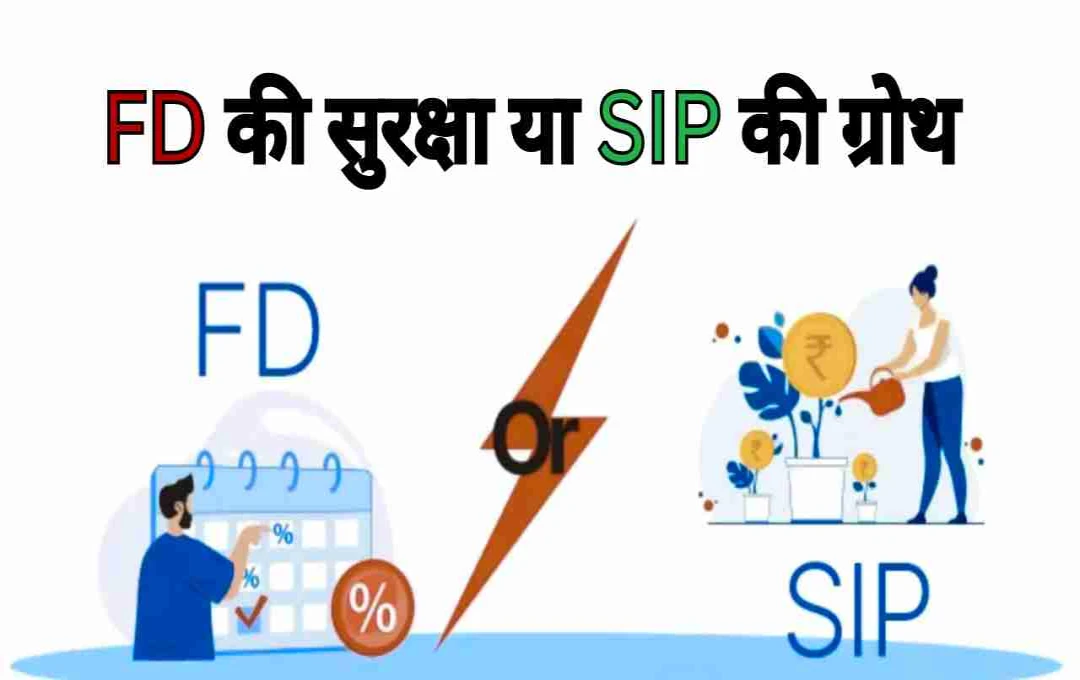Whenever someone starts investing, they typically face two common options: SIP and FD. Both offer advantages in their own ways, and each has its own unique features. However, it's easier for an investor to make the right choice when they clearly understand the differences between the two.
SIP: A Method of Investing in Installments
SIP, or Systematic Investment Plan, is a method of investing in mutual funds. In this method, the investor invests a fixed amount every month. This method is particularly convenient for those who do not want to invest a large sum at once but want to accumulate a good amount gradually.
Money invested through SIP is channeled into mutual funds, which are linked to the market. This means that the returns from SIP depend on the movement of the stock market. SIP also benefits from compounding, or compound interest.
The NAV (Net Asset Value) of a mutual fund changes daily. Because of this, when units are purchased through SIP, they are sometimes cheaper and sometimes more expensive. This averages out the cost and creates the potential for better returns in the long run.
FD: Fixed and Secure Investment

FD, or Fixed Deposit, is considered one of the safest investment options. It offers a fixed interest rate, and the investor knows how much money they will receive back after a certain period.
FDs are offered by banks, post offices, and NBFCs (Non-Banking Financial Companies). They are better suited for people who do not want to take risks and prioritize fixed returns.
Some FD schemes also offer tax benefits under Section 80C of the Income Tax Act. However, the returns, especially considering inflation, are not considered very high.
Significant Difference in Risk and Return
SIP is linked to the market, so it involves risk. However, this risk also offers the potential for higher returns in the long run. On the other hand, FD is a completely safe investment, with almost no chance of losing money, but its returns are limited.
SIP may be suitable for those who can take risks and intend to stay invested for the long term. FD is suitable for those who want to keep a lump sum amount safe.
Investment Period Also Matters
FDs typically have a fixed tenure of 1 to 5 years, while in SIP, the investor decides how long they want to invest. SIP offers more flexibility – you can stop contributing money whenever you want or withdraw money when needed.
The Difference is Even Greater When it Comes to Tax
The interest earned from FD is taxable. If the annual interest exceeds ₹40,000 (₹50,000 for senior citizens), the bank deducts TDS (Tax Deducted at Source).
On the other hand, the returns from SIP are also taxable, but this depends on how long you have invested the money and what type of fund you have invested in. Investing in equity funds for more than 1 year attracts Long Term Capital Gains Tax, which can prove to be somewhat beneficial.
Understanding the Investment Objective is Essential

If your goal is simply capital protection and you need a fixed return, then FD can be beneficial. However, if you want to raise funds for major goals such as children's education, buying a house, or retirement, then SIP can be a better option.
Understand the Difference Between the Two in This Way
Risk
- SIP: Moderate to high risk, as it depends on the movement of the stock market.
- FD: Very low risk, as it is a safe option offering a fixed return.
Return
- SIP: Returns are market-based, so potentially higher.
- FD: The interest rate is predetermined, so the return is limited and fixed.
Liquidity
- SIP: You can make partial withdrawals (with some conditions), especially in open-ended mutual funds.
- FD: Penalty is levied for premature withdrawal, so it is less liquid.
Tax Benefit
- SIP: Investing in some funds like ELSS (Equity Linked Saving Scheme) offers tax exemption under Section 80C.
- FD: 5-year tax-saving FD offers tax exemption under Section 80C.
Investment Mode
- SIP: Investment is done in monthly installments, which is convenient for salaried investors.
- FD: Usually a lump sum amount has to be deposited, which reflects the need for a large amount.
What do Financial Experts Say About Investment?
Many financial advisors, including ICICI Direct, say that investors should choose either SIP or FD, or a combination of both, keeping in mind their risk appetite, financial goals, and investment period. Sometimes, maintaining a balance between the two is considered more effective.














